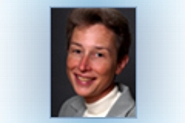
Ann Owen, director of the Arthur Levitt Public Affairs Center and associate professor of economics, led a discussion about the economic proposals of presidential candidates Bush and Kerry at the first Levitt Center Think Tank lunch of the semester. While the candidates recognize the same economics-related issues as important ones (health care, education, deficit reduction, tax cuts, Social Security), Owen said, they sometimes have very different approaches to solving them.
In some areas, the differences in the proposals of the two candidates are fairly similar, Owen said. On education and trade, they both recognize the important problems with the systems and have somewhat similar plans to address it. For example, both support job training for the unemployed and doing things to help small businesses.
Their relative similarities on these issues are contrasted with what Owen called "philosophical differences" in other areas. One is the area of taxation and decreasing the deficit. Kerry's plan includes rolling back the tax cuts for the richest portion of the population to pay down the deficit and finance spending, while Bush's plan is to maintain the current tax cuts and hope that they will stimulate the economy. If you want to stimulate the economy through tax cuts, Owen said, Kerry's plan to emphasize tax cuts for the middle and lower classes might be better, in that these people will spend a much higher percentage of whatever income they have that the very rich will. Owen also said that the "PayGo" plan that Kerry has talked about is something that we will "just have to do." According to Owen however, both candidates will have to change their plans on taxation and the deficit to make them work properly.
Bush and Kerry's differences on Social Security and Medicare come from some different conceptions of what the goal of what these programs should be, Owen said. Social Security currently functions both as a forced savings account for retirement, but also as a safety net and redistribution device for poor seniors. Bush's plan to potentially privatize Social Security with personal retirement accounts only addresses the forced savings goal of the program, Owen said. She then discussed with the lunch's attendees different ways Social Security might be reformed - raising the retirement age, lowering the cap on Social Security taxes.
On the issue of health care the candidates positions also show a fundamental difference, Owen said. Bush's plan to address the rising costs of health care is consumer and market-driven, hoping to create lower prices through market competition and choice. Meanwhile, Kerry wants to fix the problem of high premiums by having a health care plan involving more people to distribute the costs more widely. Each of the candidates has a plan to address one part of the problem, Owen said.
The Levitt Center's Think Tank lunch series continues this semester with talks by professor of government Robert Martin on Nov. 5, professor of religious studies Jay Williams on Nov. 12, professor of government Peter Cannavo on Nov. 19, and lecturer in computer science Kevin Kwiat on Dec. 3.
-by Caroline O'Shea '07
